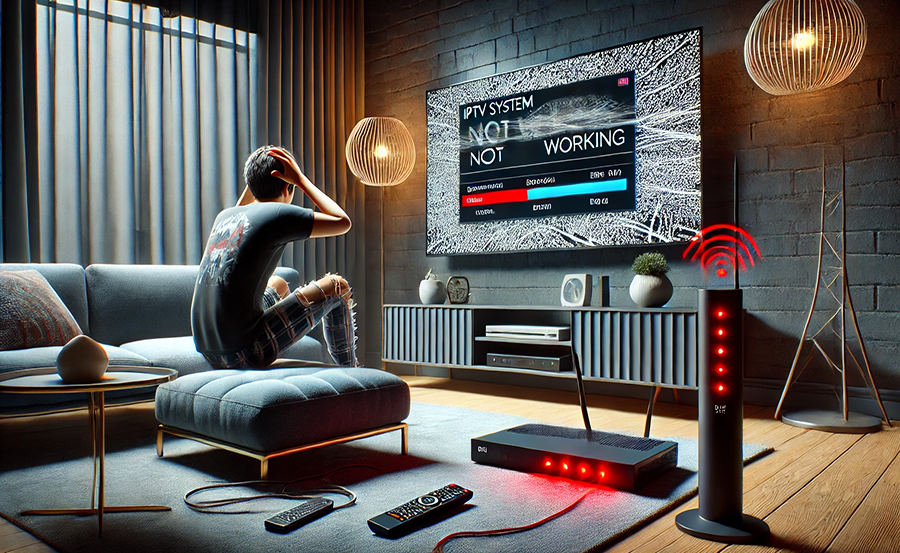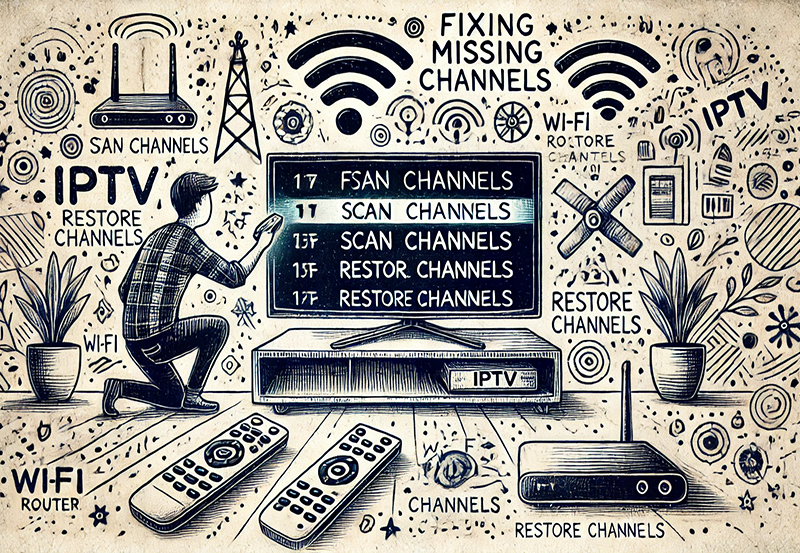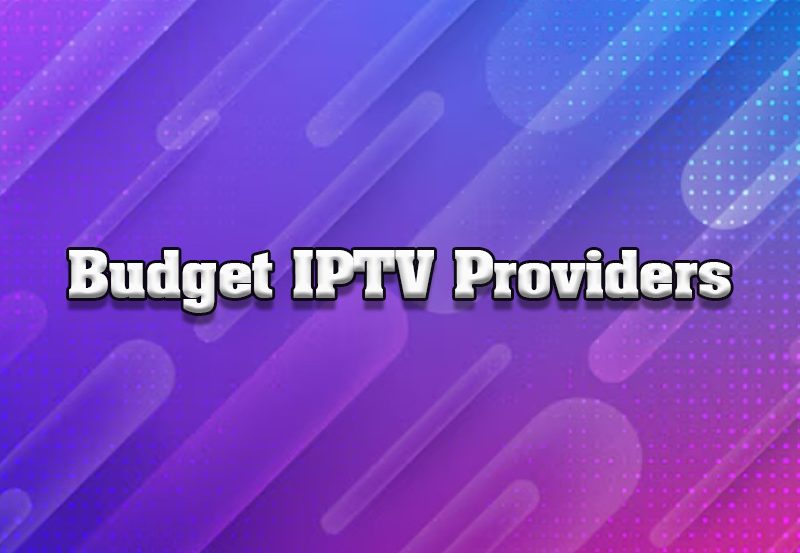Understanding Internet Speed and Its Impact on IPTV Streaming
In today’s fast-paced digital world, achieving optimal internet speed is instrumental in enhancing your IPTV (Internet Protocol Television) streaming experience. Whether you’re a casual viewer or someone who relies heavily on digital streaming for entertainment, understanding the nuances of internet speed can dramatically transform your IPTV viewing habits.
The rise of IPTV has changed how we consume media, providing access to a plethora of channels and on-demand content through the internet. However, streaming quality extensively relies on your internet speed. As such, achieving a fast and stable connection should be a priority for an uninterrupted viewing experience.
Before diving deeper into ways of improving your internet speed, it is crucial to understand the basic requirements that your internet connection should meet for an optimal IPTV streaming experience. After all, effective streaming isn’t just about having the best IPTV service providers—it’s also about making sure your network infrastructure supports the content flow efficiently.
Buy 1 Year IPTV Subscription and Enjoy Unlimited Content
Factors Affecting Internet Speed for IPTV
Bandwidth and Its Relevance
Bandwidth, often considered synonymous with internet speed, is the amount of data that can be transferred over your internet connection in a given time frame. When you watch IPTV, video data flows from the servers to your local network. Hence, the available bandwidth significantly affects your streaming performance.
1. Connection Type: Different types of connections (e.g., DSL, fiber-optic) offer varying bandwidth capabilities. Fiber-optic connections generally provide the highest speeds.
2. Network Congestion: During peak hours, too much traffic can lead to reduced bandwidth availability, affecting stream quality.order IPTV
Latency and Its Impact
Latency refers to the delay before a transfer of data begins following an instruction for its transfer. Low latency is crucial for real-time applications like IPTV, where even slight delays can disrupt your experience.
1. Geographical Distance: The distance between the end-user and the server influences latency. Closer proximity generally means lower latency.
2. Router Efficiency: A high-quality router can process data transfers more efficiently, reducing unnecessary delays.
Packet Loss Explained
Packet loss occurs when data packets traveling across a network fail to reach their destination. This can result in buffering and degraded picture quality on IPTV, especially during high-definition streaming.
An effective way to manage packet loss is by utilizing a robust ISP service that offers reliable packet transmission methods to improve streaming efficacy.
Enhancing Your Internet Speed for Better IPTV Streaming
Optimizing Your Network Setup
To optimize your IPTV viewing habits, begin by examining your current network setup. Is your router capable of supporting the bandwidth demands of high-definition video streams?
Position your router at a central location in your home away from obstructions or sources of interference like microwaves. This can help improve signal strength throughout the area, catering better to your IPTV needs.
- Upgrade to a dual-band or tri-band router for efficient data separation.
- Use wired connections for your IPTV device to ensure stable and fast data transfer.
Choosing the Right Internet Plan
Selecting the best internet service plan for IPTV usage involves evaluating the data speed capabilities offered by the ISP against your specific streaming requirements. High-definition streaming generally requires at least a 5 Mbps connection.
Research and compare the best IPTV service providers along with their bundled internet solutions to achieve adequate streaming speeds. Always consider customer reviews and recommendations before making a decision, as they provide insight into actual performance.
Optimizing Your Device Settings
Device settings often play a crucial role in influencing internet speed. Disable background applications that consume bandwidth and prioritize your IPTV application’s traffic.
Consider updating the firmware of both your IPTV device and router, as updates often contain fixes that can improve network performance.
Troubleshooting Common Buffering Issues
Network Interference Checks
Buffering is a common concern while streaming IPTV, mainly if your connection is disrupted by network interference. Check for interference from nearby networks, especially if you’re using Wi-Fi.
Consider changing your Wi-Fi channel to one that experiences less interference from neighboring devices. Use Internet speed tests to identify potential access points experiencing Wi-Fi congestion.
ISP Limitations
Sometimes, your ISP might throttle your speed during high-traffic periods, affecting streaming capabilities. If you’ve exhausted all solutions, talk to your ISP about potential throttling issues.
Ask them for various package options that potentially avoid bandwidth throttling, especially if you’re a frequent streamer.
Third-party Enhancement Options
Using third-party hardware like network extenders can help distribute the internet effectively across large homes, ensuring no single device hogs all the bandwidth.
Some users also find success with professional IPTV resellers or using services that optimize server preferences to provide seamless streaming experiences without interruptions.
Maintaining Optimal Network Health
Regular Monitoring
Keeping an eye on your internet usage and performance helps in diagnosing problems early and averting disruptions. Use network-monitoring tools to track bandwidth consumption over time.
If you notice a gradual slowdown in speed, investigate whether additional devices have been connected to the network without your knowledge.
How to Reduce Data Usage While Streaming IPTV
Security Measures
Your network speed might be compromised by unauthorized users. Protect your Wi-Fi with strong passwords and encryption protocols such as WPA3.
Regularly updating your device’s security settings keeps potential intruders at bay, ensuring the bandwidth remains dedicated to your IPTV needs.
Routine Equipment Checks
Over time, hardware might degrade, affecting performance. Routinely check and maintain equipment like routers and cables to ensure they function optimally.
Consider replacing outdated hardware every few years to leverage advancements that come with newer models, enhancing your IPTV experience significantly.
Creative Exploration of IPTV Streaming Options
While we’re on the topic of enhancing your IPTV experience, why not explore additional features that many IPTV platforms offer? You can often discover a variety of international channels, on-demand movies, and even interactive content.
Explore custom settings that allow for personalized viewing preferences, making the most out of your streaming capabilities. By tweaking subtitles, audio options, and display settings, you can optimize the content delivery to suit your tastes.
Engagement with IPTV isn’t solely limited to watching; it’s about crafting a holistic experience that meets your entertainment desires.
FAQs on Boosting Internet Speed for IPTV

What is the ideal internet speed for IPTV streaming?
The ideal speed depends on the content quality you’re aiming for. Generally, standard definition requires about 3 Mbps, HD needs around 5-8 Mbps, and 4K streams could require at least 25 Mbps.
How can I check my current internet speed?
You can use online speed test tools like Speedtest.net or Fast.com. These services provide quick assessments of your upload and download speeds, helping you gauge if they’re sufficient for IPTV streaming.IPTV service
Are there any software solutions to enhance streaming quality?
Certain network management applications enable you to prioritize bandwidth allocation to your IPTV service. Tools like QoS settings on modern routers allow efficient data traffic management.
Does the quality of my HDMI cable affect streaming?
While the HDMI cable primarily affects display quality, ensuring you use a high-speed HDMI cable can optimize the transmission of video and audio signals, preventing potential bottlenecks in your setup.
Can VPN services enhance IPTV streaming?
VPNs can sometimes aid in streaming by bypassing throttling imposed by ISPs in certain regions. However, ensure the VPN provider offers fast servers; otherwise, it may introduce unnecessary latency.
Best Budget IPTV Providers: Value for Money





